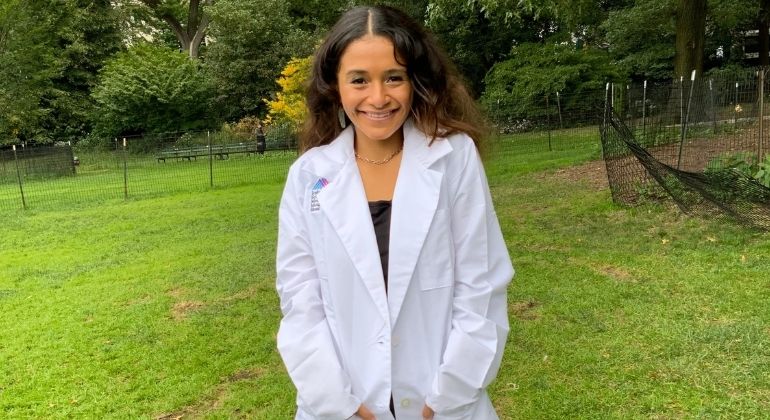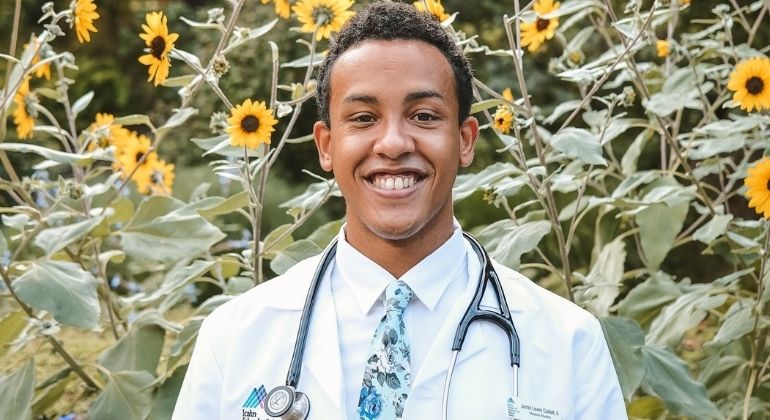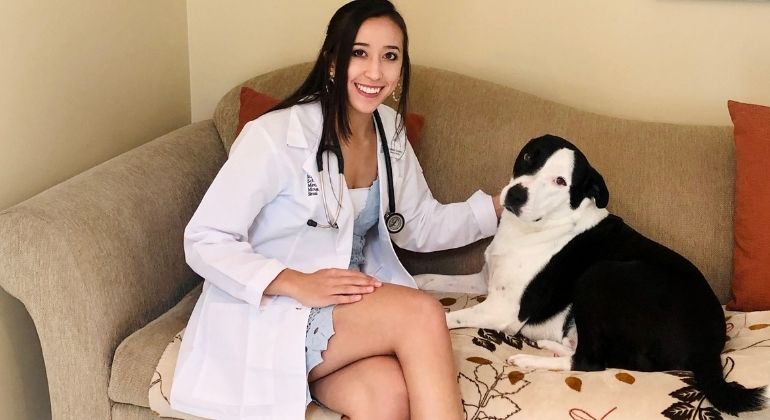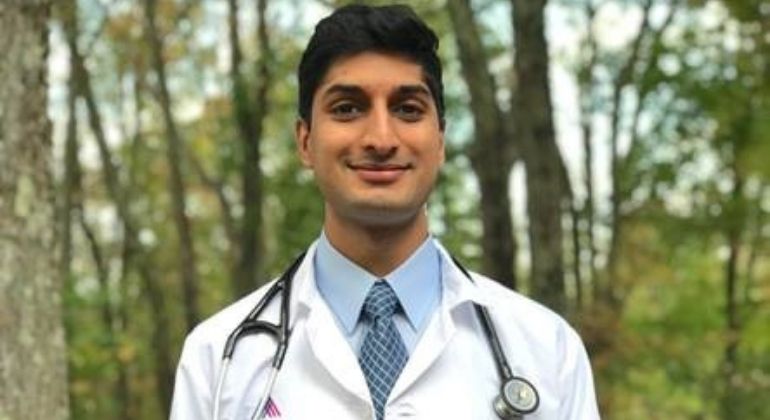Why I Want to Be a Doctor Now: Med Students Discuss What Makes Them Want to Help and Heal
Students Write White Coat Ceremony Oath Pledging to “Serve as Agents for Social Justice”

Candida Damian
Stephen McCroskery

Jerrel Catlett

Calista Dominy

Suvruta Iruvanti
The White Coat ceremony represents a rite of passage, launching first-year medical students on their formal careers in a gathering of faculty, colleagues, and family. In this era of social distancing, the Icahn School of Medicine at Mount Sinai’s White Coat ceremony takes place via Zoom on Tuesday, October 13.
But why become a doctor now, in a pandemic, when providing care can be potentially life-threatening to the clinician? Incoming students describe what makes them want to help and heal, and the oath they have written together—at this unprecedented time in the history of American medicine—as a guide to their future careers as physicians.
Candida Damian, who is Black/Guamanian and was raised in Alabama, never went to the doctor as a young girl because her single mom could not afford health insurance. “All I knew about doctors was what I saw on TV,” she says. “I wanted to work and care for patients at an intimate level. It was in nursing school that I gained the exposure I needed to realize that I not only wanted to change careers to become a doctor, but I needed to do it so I could provide the level of care necessary for my patients.”
Candida says that inequities in health care have always been there but are just more visible now, making this a critical time to join the profession. “My deepest ambition as a doctor is to ensure that everyone, no matter who they are, has access to health care. As a Black /Guamanian future physician, who will represent diverse and under-resourced communities, it will be my duty to use my voice to advocate for change and to remove the barriers that I experienced as a young girl," she says.
Stephen McCroskery suffered for years with untreated sleep apnea before it was noticed by his brother on a visit home from college. The diagnosis, delivered by a tactful physician, would set him on a path into medicine. “The doctor’s style was so gentle,” says Stephen. “While I did have a weight problem, the way he suggested that I lose weight helped me understand my diagnosis and the need to lose the necessary weight to control the sleep apnea. It had been wreaking havoc in my life for years,” he says.
Stephen begins medical school with a running start, having graduated from the Icahn School of Medicine’s Master of Science in Biomedical Science (MSBS) program. While studying for his Masters, he worked in the lab of Peter Palese, PhD, a world-renowned microbiologist who oversees a lab committed to understanding viruses, their makeup, and how they spread.
While working on a universal influenza vaccine, the lab has also pivoted to understanding the Sars-Cov2 virus and developing a vaccine candidate. “We are hopeful it will go to clinical trials. One thing we like about this vaccine is that it would be manufactured in chicken eggs, making it much less expensive to produce and therefore more accessible to countries that are not as wealthy as the United States,” he says. “Unfortunately a lot of people don’t believe in vaccines. In light of this, I want to advocate for science and medicine and give my patients the best information on which to make the best decisions for their health.”
Jerrel Catlett says the pandemic served as a major turning point in his life and career. “I would say—as an African American—the pandemic has made me acutely aware of how vulnerable my community is,” he says. Teaming up with three other Icahn students, he developed an anti-racism discussion series open to faculty, physicians, and hospital administrators across the Mount Sinai Health System to engage in small group conversations focusing on how anti-Black biases and prejudices manifest in medical practice and research. “I feel more empowered now because we are gaining the literacy and language to describe what is happening around us, and identifying ways to be a part of the solution.”
He wants to be a physician-scientist in pediatric oncology. Prior to embarking on the MD program at the Icahn School of Medicine, he worked at the Broad Institute of MIT and Harvard, and Dana-Farber Cancer Institute. However, it was the young patients he met conducting research in childhood bone tumors who started him on a medical career. “I was incredibly moved by the kids I met while shadowing at Dana-Farber,” he says. “The extent to which they seemed to be aware of the impact of their disease on themselves and their families at such a young age was heartbreaking, but they are among the strongest people I have ever met. Knowing them made me really want to help.”
Calista Dominy represented one of 18 writing groups working together to write the oath to be recited by her classmates at the White Coat ceremony. Crafting the oath is an annual process to reflect the sentiments and promises of the class of 140 incoming students.
Her group wanted to focus on empathy and humility. “We wanted to use the word ‘ally’ to reflect that we as doctors must be on the same level with our patients,” she says. “Weaving into the oath a strong commitment to fighting the inequities that surround us became a collective priority. I think we all really feel an incredibly strong commitment to social justice as a collective group.” This year, for the first time, the oath references current events, including police brutality.
The school’s commitment to social advocacy was one of the prominent reasons she was drawn to Mount Sinai. “My eyes have been open to several injustices as a woman who is half Filipina. In my search for a medical school, finding an environment committed to racial justice was extremely important. I am so happy to be at Mount Sinai now because the hospital and the school are really doing as much as they can to eradicate racism, especially in medicine, and especially now.”
Suvruta Iruvanti works as a volunteer at Mount Sinai’s clinic for the uninsured, the East Harlem Health Outreach Partnership (EHHOP), helping patients who require specialized care or financial assistance navigate the hospital system. Removing barriers and helping under-resourced patients obtain care has long been a career priority. As an undergraduate pursuing simultaneous degrees in Molecular and Cell Biology and Business at the University of California, Berkeley, he led a team of students into the northern Himalayan region of India to set up a clinic that would provide dental care for rural residents, many of whom had never seen a dentist.
Having studied prostate and ovarian cancer at the Broad Institute, he is interested in the possibilities of medicine to uncover new treatments for patients with advanced stage diseases. “The ‘why’ in disease has always intrigued me and propelled me toward medicine to find answers,” he says.
Suvruta, who took on the role of scribe in writing the school oath, says the writing process was remarkably smooth as groups came together to submit contributions, then collaborated on editing through remote tools. “Zoom is definitely a different modality, but we are still moving at the same pace even though we are not physically together.”
One of the positives of a virtual White Coat ceremony, he says, is that he can invite as many family members from as many far-flung locations as he wishes to witness his big moment, via Zoom.
About the Mount Sinai Health System
Mount Sinai Health System is one of the largest academic medical systems in the New York metro area, with 48,000 employees working across seven hospitals, more than 400 outpatient practices, more than 600 research and clinical labs, a school of nursing, and a leading school of medicine and graduate education. Mount Sinai advances health for all people, everywhere, by taking on the most complex health care challenges of our time—discovering and applying new scientific learning and knowledge; developing safer, more effective treatments; educating the next generation of medical leaders and innovators; and supporting local communities by delivering high-quality care to all who need it.
Through the integration of its hospitals, labs, and schools, Mount Sinai offers comprehensive health care solutions from birth through geriatrics, leveraging innovative approaches such as artificial intelligence and informatics while keeping patients’ medical and emotional needs at the center of all treatment. The Health System includes approximately 9,000 primary and specialty care physicians and 10 free-standing joint-venture centers throughout the five boroughs of New York City, Westchester, Long Island, and Florida. Hospitals within the System are consistently ranked by Newsweek’s® “The World’s Best Smart Hospitals, Best in State Hospitals, World Best Hospitals and Best Specialty Hospitals” and by U.S. News & World Report's® “Best Hospitals” and “Best Children’s Hospitals.” The Mount Sinai Hospital is on the U.S. News & World Report® “Best Hospitals” Honor Roll for 2025-2026.
For more information, visit https://www.mountsinai.org or find Mount Sinai on Facebook, Instagram, LinkedIn, X, and YouTube.